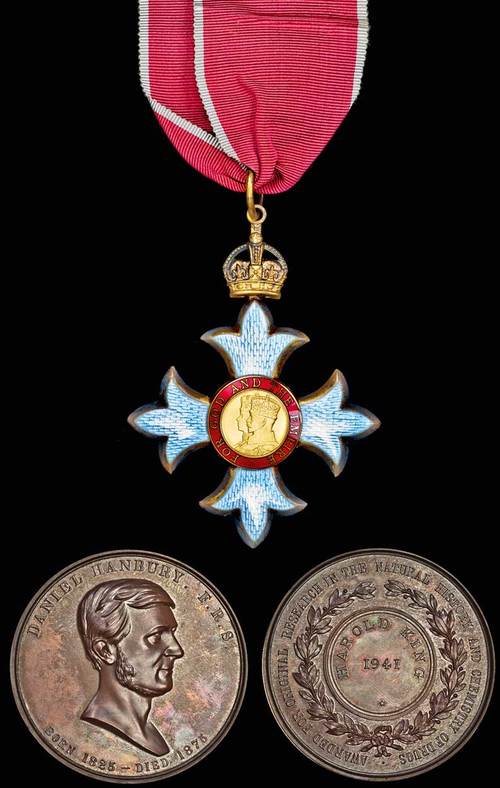
Auction: 16002 - Orders, Decorations, Campaign Medals and Militaria
Lot: 167
The Interesting and Scientifically Important C.B.E. and Bronze Hanbury Medal to Dr H. King, F.R.S., A Pioneering Chemist Who Revolutionised the Understanding of the South American Curare Poison
The Most Excellent Order of the British Empire, 2nd type, Civil Division, Commander's (C.B.E.) neck Badge, silver-gilt and enamel, extremely fine, in Garrard, London case of issue and with neck riband, together with the following items:
- Pharmaceutical Society of Great Britain, Hanbury Medal 1875, bronze, 58mm, reverse embossed 'Harold King 1941', extremely fine, in case of issue
- The original bestowal document for the C.B.E., named to Harold King Esquire, Doctor of Science, Fellow of the Royal Society, and dated 8.6.1950, this in the original damaged envelope
- A copy of the Statutes of the Order, dated 1948 and with named Central Chancery enclosure
- A letter upon 10 Downing Street letterhead, marked 'Personal & Confidential' to 'Harold King, Esq., D.Sc., F.R.S.', confirming that the Prime Minister intended '...to submit your name to the King with the recommendation that he be graciously pleased to approve that you be appointed a Commander of the Order of the British Empire'
- Buckingham Palace Investiture Ticket stub, dated '4 Jul. 1950'
- Ticket for Mrs H. King to the Inaugural Ceremony by His Majesty the King at the Medical Research Council, 5.5.1950
- Copied portrait photograph of the recipient (Lot)
C.B.E. London Gazette 8.6.1950 Harold King, Esq., F.R.S., lately Head of the Chemistry Division, National Institute for Medical Research
Dr Harold King, C.B.E., F.R.S., born Llanegan, Caernarvonshire, February 1887, the son of Herbert and Ellen King, both Head Teachers at St. James's School, Bangor. He was educated at St James's Bangor, Friars' Grammar and Bangor University, graduating in 1909 with a First Class Degree in Chemistry, following which he remained at Bangor completing two years of post-graduate study. During 1912 King took up a temporary post in the Wellcome Physiological Research Laboratories at Herne Hill. Under the supervision of Sir Henry Hallett Dale, O.M., G.B.E., P.R.S. (1875-1968) and Dr George Barger, F.R.S. (1878-1939), his desire and ambition in the world of chemistry was ignited. His initial appointment led to a permanent role at the Wellcome Chemical Works at Dartford working alongside Dr Frank Lee Pyman, F.R.S. (latterly Director for the Boots Pure Drug Company), developing research into glycerophosphates. Upon the outbreak of the Great War, the requirement for the development of the British synthetic drug industry was an urgent project undertaken by Wellcome, including Pyman's laboratory. During the Great War, King expanded his knowledge completing research into the development of hyoscine. Following the conclusion of the War, King was accepted onto the scientific staff of the Medical Research Council, at the National Institute for Medical Research. He remained with the Institute throughout his entire career, focussing his studies in organic chemistry, the development of chemotherapy and pharmacology. Prior to the Second World War, he studied extensively the development of antiplasmodial drugs in the fight against malaria. This research assisted American scientists during the Second World War in the fight against malaria in an extensive War across many fronts. Within the United Kingdom, he was appointed Secretary of the Committee on the Synthesis of Penicillin for the duration of the War.
Curare- The Poison Pioneer
Dr King's most ground-breaking research developed the understanding of a South American hunting poison. Curare, a plant-derived compound had been used by hunters to kill their prey for centuries, but the mechanical chemistry of its action still remained unknown. Sir Henry Hallett Dale is credited for his confirmation of the action of acetylcholine in neurotransmission, which resulted in a great amount of interest into the discovery of natural neuro-inhibitors. However, it is King who discovered the specific alkaloid which acts as the active agent in curare, in a published series of papers which began in 1935. Once d-tubocurarine chloride was confirmed by King, he latterly also demonstrated the botanic origins of the compound and its exact chemical architecture. Such a pure and complete discovery resulted in an immediate implementation of his findings, especially in surgery. Once dosages were calculated, his alkaloid was introduced as a muscle relaxant. Furthermore, the initial study fostered the search for further natural and synthetic molecules which might replicate its effects. The work done in King's laboratory by Dr Eleanor Christides Zaimis (1915-1982) resulted in the discovery of the methonium compounds, powerful blocking agents, which in study induced a drop in blood pressure. It can therefore be derived that the work of King, with his initial studies into the curare compounds, led to the first effective drugs in the treatment of hypertension.
Dr King died at Wimborne, Dorset, 20.2.1956.
His achievements were also recognised by the scientific community. He was elected a Fellow of the Royal Society in 1933, receiving the Hanbury Medal in 1941 (see Lot 168) and awarded the Addingham Gold Medal of the William Hoffman Wood Trust in 1952 (see Lot 169).
Subject to 20% VAT on Buyer’s Premium. For more information please view Terms and Conditions for Buyers.
Sold for
£450




